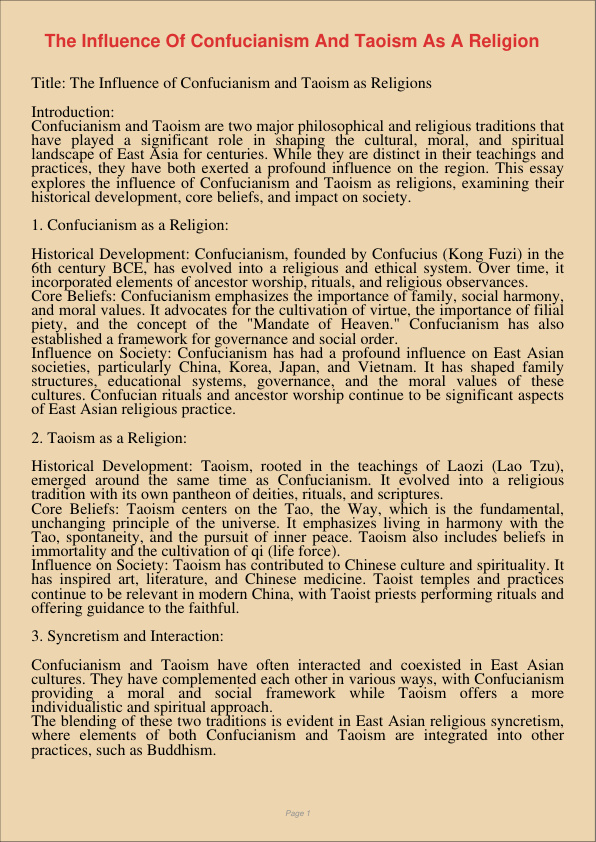
Title: The Influence of Confucianism and Taoism as Religions
Introduction: Confucianism and Taoism are two major philosophical and religious traditions that have played a significant role in shaping the cultural, moral, and spiritual landscape of East Asia for centuries. While they are distinct in their teachings and practices, they have both exerted a profound influence on the region. This essay explores the influence of Confucianism and Taoism as religions, examining their historical development, core beliefs, and impact on society.
- Confucianism as a Religion:
Historical Development: Confucianism, founded by Confucius (Kong Fuzi) in the 6th century BCE, has evolved into a religious and ethical system. Over time, it incorporated elements of ancestor worship, rituals, and religious observances. Core Beliefs: Confucianism emphasizes the importance of family, social harmony, and moral values. It advocates for the cultivation of virtue, the importance of filial piety, and the concept of the “Mandate of Heaven.” Confucianism has also established a framework for governance and social order. Influence on Society: Confucianism has had a profound influence on East Asian societies, particularly China, Korea, Japan, and Vietnam. It has shaped family structures, educational systems, governance, and the moral values of these cultures. Confucian rituals and ancestor worship continue to be significant aspects of East Asian religious practice.
- Taoism as a Religion:
Historical Development: Taoism, rooted in the teachings of Laozi (Lao Tzu), emerged around the same time as Confucianism. It evolved into a religious tradition with its own pantheon of deities, rituals, and scriptures. Core Beliefs: Taoism centers on the Tao, the Way, which is the fundamental, unchanging principle of the universe. It emphasizes living in harmony with the Tao, spontaneity, and the pursuit of inner peace. Taoism also includes beliefs in immortality and the cultivation of qi (life force). Influence on Society: Taoism has contributed to Chinese culture and spirituality. It has inspired art, literature, and Chinese medicine. Taoist temples and practices continue to be relevant in modern China, with Taoist priests performing rituals and offering guidance to the faithful.
- Syncretism and Interaction:
Confucianism and Taoism have often interacted and coexisted in East Asian cultures. They have complemented each other in various ways, with Confucianism providing a moral and social framework while Taoism offers a more individualistic and spiritual approach. The blending of these two traditions is evident in East Asian religious syncretism, where elements of both Confucianism and Taoism are integrated into other practices, such as Buddhism.
- Contemporary Relevance:
Confucianism and Taoism continue to influence East Asian societies and individuals in the modern world. While some may not practice these religions formally, their principles and values persist in cultural norms, ethical codes, and philosophical outlooks.
Conclusion: Confucianism and Taoism, while distinct in their teachings and practices, have significantly influenced the religious and cultural landscape of East Asia. Both traditions have deep historical roots, core beliefs that guide ethical and moral conduct, and a lasting impact on society. Their continued relevance in contemporary East Asia highlights the enduring power of these philosophical and religious systems in shaping the lives and values of millions of people.
「真诚赞赏,手留余香」
真诚赞赏,手留余香
使用微信扫描二维码完成支付
